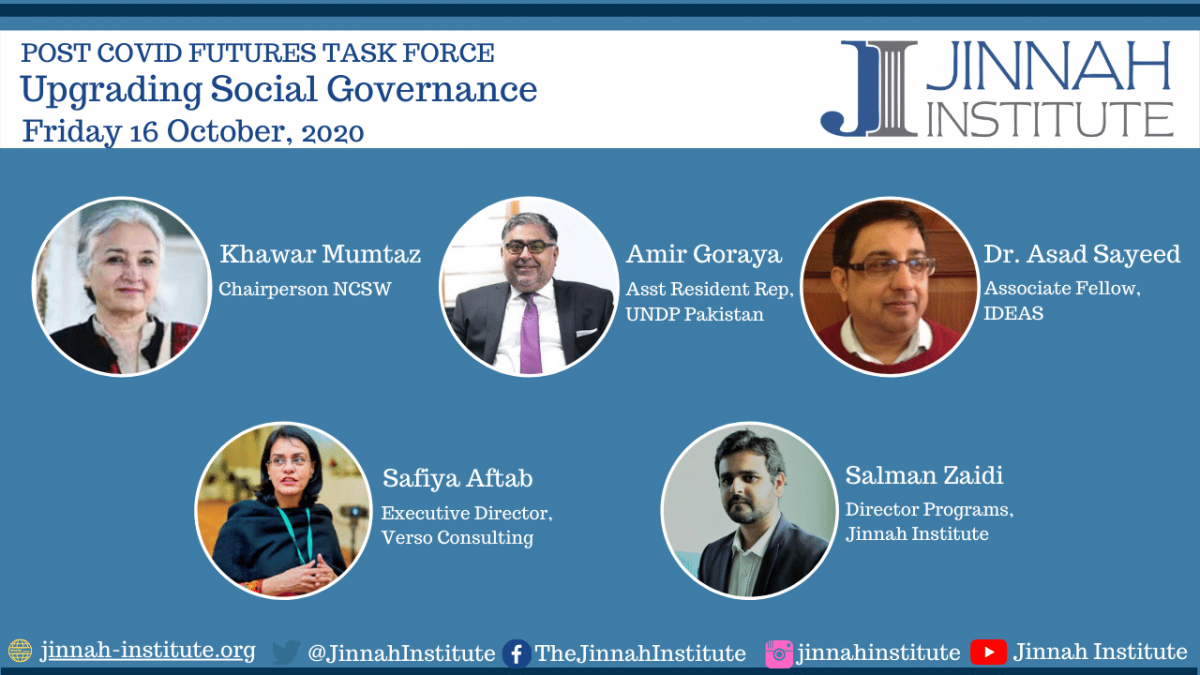POST COVID FUTURES ROUND TABLE
Upgrading Social Governance – Part I
Date: October 16, 2020
Moderator:
Salman Zaidi, Director Programs, Jinnah Institute
Safiya Aftab, Executive Director, Verso Consulting
Speakers:
Dr. Asad Sayeed, Associate Fellow, IDEAS
Amir Goraya, Assistant Resident Rep, UNDP
Khawar Mumtaz, Chairperson NCSW
While the repercussions of the COVID-19 pandemic have been discussed with regards to its impact on the economic, education, and health sector, there are issues that have not yet been addressed in the public domain which require our attention. Amir Goraya explained that the psychosocial impact of COVID-19 is something that has evaded discourse thus far. While schools have instituted SOP’s with regards to wearing protective equipment, little attention has been paid to the psychosocial burden being placed upon students, and even teachers who have struggled to adapt to the increasingly digital educational environment. Mr. Goraya further stated that the government’s response was essentially an emergency and surge one and centralised for the most part. “There was a lack of a local government response to a problem that was local in the first place. A one policy fits all approach does not work very well when it comes to measures such as smart lockdowns as these initiatives need to be tailored according to local needs.”
Dr. Asad Sayeed echoed the sentiments of Mr. Goraya and explained that issues of mental health have been central to how behaviour has been altered since the onset of the pandemic. He further remarked that it is imperative to take into consideration the gendered impact of COVID-19. “Both vertical and horizontal inequalities have been further highlighted by this pandemic. Moreover, women have borne the brunt of the resulting fallout, therefore, it is important to factor in the gendered impact when talking about a post-COVID future and the manner in which the social sector will be impacted.” Reflecting on the health sector, he observed that since the onset of the pandemic, the uptake for non-COVID cases was reduced significantly. “it will be interesting to study how much the pandemic actually impacted health outcomes. Were we oversubscribing to health services prior to COVID, and was a false demand engineered over the years courtesy how the pharma industry operates?”, asked Dr. Sayeed. With regards to the education sector, Dr. Sayeed remarked that adjusting to the new educational landscape has been a global challenge, though it has been more pronounced in developing countries where the digital divide is widespread. He explained that more senior teachers have in particular faced issues with adapting to the requisite technology, which has caused a lot of stress and anxiety. He further added that the more important issue has been regarding testing and examination. “COVID has disrupted an age-old equilibrium. The entire purpose of testing is one where it serves as a credential and rationing device for further education and employment. The credibility of the entire process has been altered to say the least; it remains to be seen how the education system adapts to this going forward.”
On the topic of the rapid digitization drive amidst the pandemic, Amir Goraya pointed out that COVID has certainly acted as a catalyst. In the health sector, we witnessed the recruitment of doctors for tele-medicine services and even ICU’s. Additionally, there has been a significant increase in online meetings, with a focus on over-communication to compensate for the change in work dynamics. On the government’s response to the pandemic, Mr. Goraya lamented the fact that there was not a coordinated response from the government with regards to the education and health sectors. “The response was solely focused on responding to an emergency with stop gap measures without building any resilience. It is perhaps a little premature to judge the government’s response and suggest policy interventions because before we can evaluate the damage, we are already experiencing the second wave of the pandemic.”
With regards to the economic response of the government, Khawar Mumtaz opined that the Ehsaas program did provide relief to the most disadvantaged and the distribution of funds was efficiently managed thanks to the local organisations working on the ground. However, she added that the government needs to transition out of crisis management mode and work towards better managing and anticipating such crises. Dr. Asad Sayeed added that on the financing side, instead of a fiscal stimulus, the response from the government was a monetary one that has contributed to the current climbing inflation rates.
Khawar Mumtaz also raised the pressing issue of the reported rise in gender-based violence during the lockdown. In areas where they are active, groups and civil society organisations have been helpful in providing women with a support system. However, there is a need for a greater number of services that women can avail in cases where they are subjected to violence or mental stress. These services are essential since women don’t always approach the court straight away. Ms. Mumtaz further added that there needs to be a critical mass of women being part of policy making, and not being limited to just token participation. She concluded by stating that, “it is crucial for women to be at the table. Even during the pandemic, while relief was provided to women, there are still no structural reforms in the pipeline that focus on alleviating issues that affect women disproportionately.”
Focusing on the path ahead, Dr. Asad Sayeed remarked that it is important to institutionalise a disaster management response in both spirit and the existing architecture of federalism in Pakistan. Such crises always exacerbate existing inequalities, especially from a gender lens. Going forward, Pakistan would benefit from having a comprehensive financing structure to deal with such situations. Regarding the public sector response, he added that measures cannot be sectoral in their outlook focusing on either the health or the education sector, instead we need to factor in the intersection of these spheres when devising policy.

